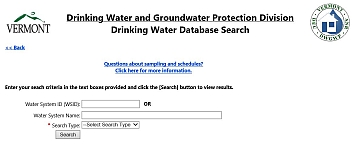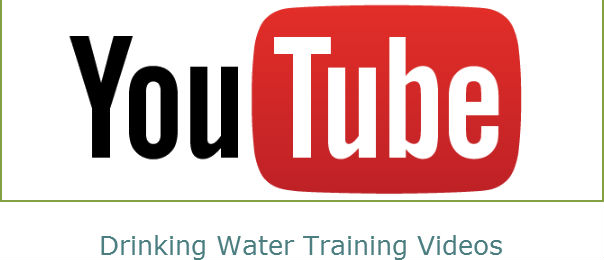The Vermont Water Supply Rule (WSR) references the Code of Federal Regulations 40 CFR. More information can be found in this section.
New USEPA Compliance Scoring System
In 2010, USEPA and state programs began implementing a new national approach for characterizing compliance with drinking water regulations by individual public water supplier. USEPA, in concert with the states, developed a scoring system that assigns points to individual violations of federal drinking water standards, monitoring, and reporting requirements based on potential impact on health. The scoring system looks at the most recent five-year history and water system scores within each state are updated quarterly. Each violation and its points are included in a water system’s score until it is either “Returned to Compliance” (RTC) or is under a formal enforcement order to address the problem. USEPA and the Vermont Drinking Water and Groundwater Protection Division will use the point system to focus compliance and enforcement efforts on those water suppliers with the highest number of points and therefore health risk and return. This approach will be more focused on public health, understandable, and transparent than the previous approach, which was based on definitions of “significant noncompliance” established rule by rule.
Other Information:
Environmental Response Policy
Safe Drinking Water Act
Revisions to the Total Coliform Rule - A “Find & Fix” Approach
In 2010, USEPA proposed revisions to the Total Coliform Rule. The revisions are intended to improve public health protection, improve rule effectiveness, and reduce rule implementation burden. There will be an overall shift in focus from monitoring results informing public notification to monitoring results informing investigation and corrective action. Systems will be required to investigate and correct any sanitary defects found whenever monitoring results show a system may be vulnerable to contamination. Benefits will include a more proactive approach to public health protection and a reduction in confusion associated with Public Notice actions for Total Coliform violations. The revised rule is expected to be finalized October 2012 and become effective three years later in April 1, 2016.
Other Information:
EPA Revised Total Coliform Rule
DEC's Revised Total Coliform Rule page
Other Relevant Rules
The Lead and Copper Rule (LCR) revision, effective December 10, 2009, enhances the implementation of the LCR in the areas of monitoring, treatment, customer awareness, lead service line replacement, and improves compliance with the public education requirement of the LCR and ensures drinking water consumers receive meaningful, timely, and useful information needed to help them limit their exposure to lead in drinking water. Lead and Copper Rule Revisions
Federal Ground Water Rule (GWR)
This rule establishes a risk-based approach to target ground water systems that are vulnerable to fecal contamination. Ground water systems that are identified as being a risk of fecal contamination must take corrective action to reduce potential illness for exposure to microbial pathogens. This rules applies to all systems that use ground water as a source of drinking water and became effective December 1, 2009.
PLEASE NOTE: All water systems with total coliform positive results from distribution sampling with be required to meet the Ground Water Rule Standards.
USEPA Quick Reference Guides and Fact Sheets for the Ground Water Rule
The State 2 Disinfectants and Disinfection Byproducts Rule (Stage 2 DBPR) builds upon the Stage 1 DBPR to address higher risk public water systems for protection measures beyond those required for existing regulations. Compliance monitoring for all systems subject to Stage 2 DBP Rule begin October 1, 2013. Previous to that Systems will need to complete an IDSE or obtain a waiver.Stage 2 Disinfection By-Products (DBP) Rule
The Well Driller Licensing Rule, effective August 29, 2002, can be found here: Well Driller Licensing Rule. For more information about the Well Licensing Rule, please contact the Water Resources Section with DWGPD.


